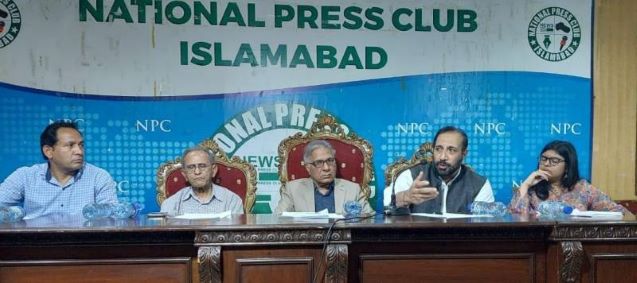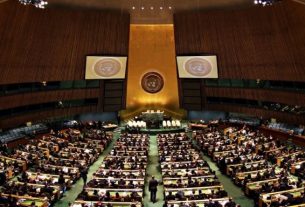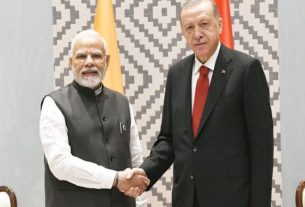ISLAMABAD: In a press conference organized by the Centre for Social Justice (CSJ) at the national press club that discussed the merits and demerits of the National Commission for Minorities Bill, 2023, the panelists called upon the government to improve the bill further before its passage in the parliament. They emphasized establishing a statutory National Commission for Minorities Rights in conforming with UN Paris Principles and the directives of the Supreme Court of 19 June 2014 (SMC No. 1 of 2014). Peter Jacob, Shafique Chaudhary, Dr. A. H. Nayyar, JayyaJaggi and Yousaf Benjamin addressed the press conference.
Peter Jacob, the executive director of CSJ said that the institutional protection of minorities in Pakistan is imperative for removing embedded inequality of rights on the basis of religion as well as to strengthen the rule of law and good governance. He welcomed the introduction of the National Commission for Minorities Bill, 2023 by the government in the National Assembly, this February. He added that the bill in its present form manifests some gaps, which need to be addressed to make the prospective minority rights body truly functional, and effective. The government should not miss an opportunity to constitute an independent, autonomous, and resourceful minority rights institution.
A human rights defender, Shafique Chaudhary noted that the mainstream political parties including PPP, PML-N, and PTI have been making pledges in the election manifestos regarding instituting a statutory National Commission for Minorities, however, the successive governments constituted ad-hoc committees (so-called commission) under a Federal Ministry (MoRA etc.) through notification/ executive order since 1990, which were inconsistent with the standards set out for national human rights institutions. The ad-hoc commissions failed to make any progress toward policy reforms and redressing complaints related to minorities’ rights because they lacked a sound legal basis, broad mandate and competence, independence and autonomy, adequate powers andresources. He wished that the government had learnt from the past experiments and the issues faced by the previous minorities commissions. He implored the government to enact a permanent National Commission for Minorities’ Rights to fulfill its promise.
An academic and researcher, Dr. A.H. Nayyar said that the Supreme Court in 2014 directed the government to establish a minority rights institution with a mandate “to monitor the practical realization of the rights and safeguards provided to the minorities under the Constitution and law, and frame policy recommendations for safeguarding and protecting minorities’ rights” (SMC No. 1/2014). The government must implement the court’s direction in letter and spirit, and constitute a body empowered to make policy recommendations, investigate complaints, and propose remedies against human rights violations.
A human rights activist, Jayya Jaggi said that the existing national human rights institutions constituted through acts of parliament in Pakistan have set the precedent of including representation from the national commission for human rights (NCHR), national commission on the status of women (NCSW), and national commission on the rights of the child (NCRC) in their composition. She added that the prospective commissionis meant to be a human rights institution and not a religious body only, therefore, the government should drop the representation of the Council of Islamic Ideology (CII) and Evacuee Trust Property Board (ETPB) proposed in the Minorities Commission Bill, and avoid having representation of minorities on the basis of denominations.
Annex:
- List of recommendations to improve the above-mentioned Bill
Centre for Social Justice (CSJ) proposed the following amendments to the National Commission for Minorities Bill, 2023, and presented to the federal government regarding the constitution of minority rights institution.
- A word ‘rights’ be included in the title of the bill, and the institution must be called National Commission for Minorities Rights (NCMR) to make the perspective clear.
- The membership and composition of the commission should enable respect and realization of human rights, therefore, it must reduce government representation and influence as well as reduce the religious divide or cancel the possibility to promote favorites among minorities or neglect others.
- Four Hindus, two each from the upper castes and scheduled castes, and Four Christians, one each from the provinces should be included to serve as members to incorporate provincial representation.
- The representation of Christians on the basis of denominations and Hindus on the basis of caste identity cannot be a qualification, therefore, the appointments should be made on merit, considering the minorities commission a human rights institution, not a religious body.
- The representation of smaller religious communities should be included to ensure reflection of the religious diversity in the composition of the minorities commission, however, one seat for Sikhs rather than three seats would be appropriate in proportion to their small population.
- The representation of the Council of Islamic Ideology (CII) and Evacuee Trust Property Board (ETPB) proposed in the bill should be dropped to constitute an independent minorities commission parallel to other national human rights institutions, rather than subservient to the above-mentioned bodies.
- It is a tradition already set to incorporate ex-officio representation in national human rights institutions (NHRI). Therefore, the minorities commission should have one representative each from the National Commission for Human Rights (NCHR), the National Commission on the Status of Women (NCSW), and the National Commission on the Rights of Child (NCRC). Moreover, this arrangement would naturally strengthen NHRI’s work, build synergies and avoid overlap.
- One representative of the Ministry of Finance should be included so that the ministry is aware of the developments and financial needs of the minorities commission.
- Make one-third female participation mandatory amongst the non-official representation, as well as, the official representation.
- The appointment to the minority rights body should be through parliament rather than a selection committee, and it should present an annual report to the parliament rather than the President of Pakistan.
- Assigning minorities commission the work regarding places of worship is beyond its mandate as it will be a departure from the functions of the national human rights institution. Moreover, it is the work of the communities, local administration, and other government bodies.
- The minorities commission should be able to use one-liner allocated budget necessary to ensure financial autonomy. Moreover, the government’s commitment to supporting NHRIs should be reflected in the Federal annual budget by allotting the budget for their functioning.__The Nation





